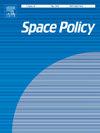火星上经济自由的典范
IF 1.9
4区 社会学
Q2 INTERNATIONAL RELATIONS
引用次数: 0
摘要
人类太空飞行计划的势头继续向火星发展,技术进步可能最终使永久太空定居成为可能。在空间维持人类生活的愿望必须以人为因素,而不仅仅是技术限制为前提,随着人类文明成为一个太空物种,治理和道德模式的进步是必要的。本文提出了一个理想但可行的火星经济自由模型,该模型位于火星被指定为地球主权司法对等的框架内。在这种情况下,火星可以通过完全储备银行和限制与任何部分储备地球货币的兑换来保持货币稳定,流通货币的数量根据固定容量基础设施内的总人口而变化。通过分散火星上的资本所有权,火星可以维持长期的政治稳定,这将使火星上的所有公民都能从资本所有权和劳动的结合中获得足够的财富,过上美好的生活。这种模式还可以支持有限的火星旅游,在这种旅游中,真实的商品可以交换服务,但行星之间的货币交易是被禁止的。这个模型展示了火星上可行和可持续经济的潜力,可以想象,包括在一个主权的火星上,也可以在其他太空定居的情况下实施。更广泛地说,该模型表明,分散资本所有权和有限政府等理念可以实现空间自由,应该探索集中式世界空间机构之外的许多模式,以确保对新兴空间经济的最佳治理。本文章由计算机程序翻译,如有差异,请以英文原文为准。
A model for economic freedom on Mars
The momentum of human spaceflight initiatives continues to build toward Mars, and technological advances may eventually enable the potential for permanent space settlement. Aspirations for sustaining human life in space must be predicated on human factors, rather than technological constraints alone, and advances in models of governance and ethics are necessary as human civilization becomes a spacefaring species. This paper presents an idealistic but feasible model for economic freedom on Mars, which is situated within a framework in which Mars has been designated as a sovereign juridical peer to Earth. Under such conditions, Mars could maintain monetary stability through full reserve banking and a restriction on exchange with any fractional reserve Earth currencies, with a volume of circulating currency that changes based on the total population within fixed capacity infrastructure. Mars could maintain long-term political stability by diffusing the ownership of capital on Mars, which would allow all citizens of Mars to draw sufficient wealth from a combination of capital ownership and labor to live a good life. This model could also support limited tourism on Mars, in which real goods are exchanged for services but currency transactions between planets are prohibited. This model demonstrates the potential for a viable and sustainable economy on Mars that could conceivably be implemented, including on a sovereign Mars but also in other scenarios of space settlement. More broadly, this model illustrates that ideas such as diffuse capital ownership and limited government can enable freedom in space, and numerous models beyond a centralized world space agency should be explored to ensure the optimal governance of the emerging space economy.
求助全文
通过发布文献求助,成功后即可免费获取论文全文。
去求助
来源期刊

Space Policy
Multiple-
CiteScore
3.40
自引率
36.40%
发文量
40
期刊介绍:
Space Policy is an international, interdisciplinary journal which draws on the fields of international relations, economics, history, aerospace studies, security studies, development studies, political science and ethics to provide discussion and analysis of space activities in their political, economic, industrial, legal, cultural and social contexts. Alongside full-length papers, which are subject to a double-blind peer review system, the journal publishes opinion pieces, case studies and short reports and, in so doing, it aims to provide a forum for the exchange of ideas and opinions and a means by which authors can alert policy makers and international organizations to their views. Space Policy is also a journal of record, reproducing, in whole or part, official documents such as treaties, space agency plans or government reports relevant to the space community. Views expressed in the journal are not necessarily those of the editors or members of the editorial board.
 求助内容:
求助内容: 应助结果提醒方式:
应助结果提醒方式:


